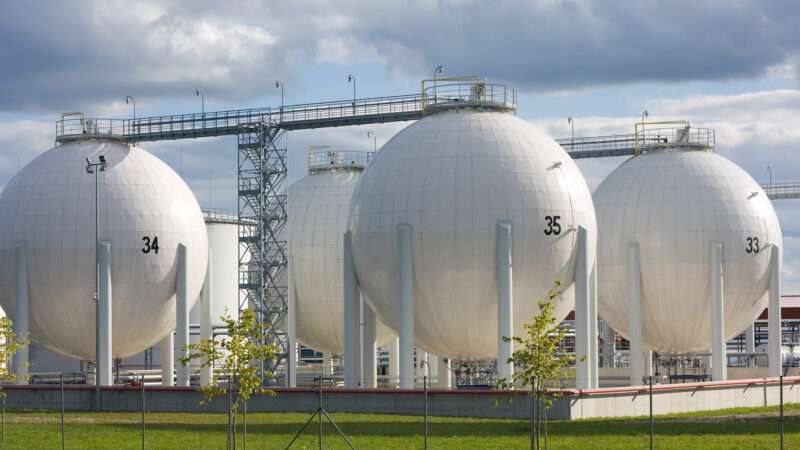
In March 2022, as crude oil prices spiked amid Russia's war in Ukraine, President Joe Biden announced that he would be tapping into the Strategic Petroleum Reserve (SPR) to help mitigate rising gas prices. In what he called a "wartime bridge," Biden authorized the release of up to 180 million barrels over six months.
This week, the Biden administration is clashing with House Republicans over a bill that would limit its control over future SPR releases. A better idea would be to simply scrap the reserve altogether.
In 1975, after an oil embargo against the United States by Arab nations, Congress established the SPR, with an emergency supply of up to 1 billion barrels. To mitigate the effects of future embargoes or foreign wars, the Department of Energy (DOE) would sell oil to oil companies experiencing shortages or disruptions.
This month, Rep. Cathy McMorris Rodgers (R–Wash.), who now heads the House Energy and Commerce Committee, introduced H.R. 21, the Strategic Production Response Act. The bill would limit the government's ability to release reserve oil until the DOE opens up more federal land for production of oil and gas. In a letter seen by Reuters, DOE Secretary Jennifer Granholm cautioned Republicans against the bill, arguing that it would "significantly weaken this critical energy security tool, resulting in more oil supply shortages in times of crisis and higher gasoline prices for Americans."
But despite numerous disbursements over the years, Biden's announcement marked only the second time the reserve had been used for its intended purpose, to address "a severe energy supply interruption" causing "a severe increase in the price of petroleum products" that is "likely to cause a major adverse impact on the national economy." More frequently, SPR oil is sold to oil companies experiencing disruptions due to natural disasters or equipment malfunctions.
In response to Granholm's letter, Rodgers told Reuters that the DOE had depleted much of the SPR's reserve "with no real plan to refill it." Indeed, the SPR achieved its peak volume of 727 million barrels in December 2009, and for much of its history, it contained 450 million barrels or more. But currently, the reserve amount sits at around 370 million barrels, its lowest level in nearly four decades. That may sound like a dire situation, but at the same time, commercial oil producers hold 448 million gallons of crude oil in inventory.*
And like any government program, the SPR is also a bad deal for taxpayers. In December, the DOE announced that it would begin repurchasing oil to replenish the reserve, bragging that the price per barrel was now lower than when it sold. But as Alan Reynolds, a senior fellow at the Cato Institute, noted in 2022, the SPR historically tends to buy oil when prices are high and sell when prices are low. For example, the DOE continued acquiring oil for the SPR even as the price of crude more than doubled between 2007 and 2008.
Clearly, the government has no business managing purchases and sales. Not to mention, it holds less in oil reserves than the amount held by private companies, who are sitting on millions of gallons. House Republicans should go one step further and get rid of the Strategic Petroleum Reserve altogether.
CORRECTION: Commercial oil producers collectively hold 448 million gallons in inventory, while the SPR contains 370 million gallons. As pertains specifically to the petroleum industry, "reserves" refer to the amount of oil that remains underground.
The post Republicans Want More Control Over America's Oil Reserve. They Should Scrap It Instead. appeared first on Reason.com.







